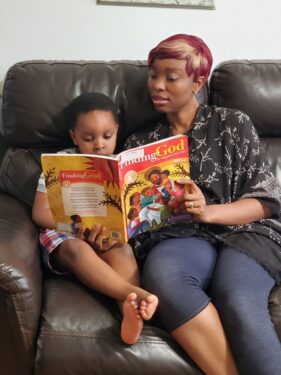
JAMAICA, Queens – When the coronavirus forced the shutdown of churches and schools in March, it didn’t mean that everything came to an abrupt halt. The Diocese of Brooklyn worked to ensure that religious education would continue uninterrupted for the 46,000 children enrolled in its parish programs.
Lessons for First Holy Communion and Confirmation candidates, as well as instruction for all of the other youngsters taught by the 6,000 catechists in the diocese, continued apace.
The smooth adjustment in the midst of a global health emergency was so successful that the diocese is organizing “Thanksgiving in June,” a celebration led by the Secretariat of Evangelization and Catechesis on June 4.
During the pandemic, religious instruction took place online and, in some cases, through a drop-off system in which parents picked up instructional materials at churches and returned their children’s written assignments upon completion.
Stella Uwaechie, whose children Audrey, nine, Tiffany, seven, and Bryan, four, are enrolled in the religious education program at Christ the King Church, Jamaica, said her kids easily adapted to the at-home regiment.
“My kids had no problem. They were already learning remotely for school. I just added religious education to their schedule,” Uwaechie told The Tablet.
“I assisted them with the reading. My nine-year-old could do a lot of it herself and my 7-year-old could also. But with my 4-year-old, I read the books and the instructional packages with him. We also read stories from the Bible every day,” she said.
The transition was a natural one because religion is a big part of life in the Uwaechie household. “It’s very important. I am originally from Nigeria and I grew up in a religious household. It means the world to me,” Uwaechie said.
Her daughters Audrey and Tiffany said they liked learning from home, but missed their classmates.
“It definitely was different,” Audrey said of her remote lessons. “I liked it. But I like being in class better. I can learn from reading it myself, but it’s easier to have the teacher telling you and to talk about it with other people,” she said.
Tiffany agreed. “It wasn’t hard but I like being in class,” she said.
The Uwaechies was one of 100 families at Christ the King that made the switch from classroom to home instruction.
“When the pandemic first happened, I met with our catechists to talk about how important it was to continue the faith journey with our children,” said Robbin Johnson, the director of religious education and a catechist.
Johnson and her fellow catechists organized packets of learning materials that picked up where things left off at the time churches and schools were closed. The packets were left in Johnson’s office at the church for parents to pick up. Johnson mailed packets to parents who could not come to pick them up in person.
As the children completed the work, parents dropped off the packets so that the catechists could assess their progress. “The packets are coming in nicely,” Johnson said.
To keep the momentum going, Johnson has two end-of-term projects in mind for the children. One is to collect bottle caps to raise money for cancer research. The other project involves having the kids write thank you letters to health care providers.
Rhonda Dieujuste, who has three children — Mallich, Joshua and Connor — in Christ the King’s religious education program, also found the transition to at-home learning easy once all the education materials were in place.
“It became part of our regular Sunday morning routine,” she said. “We watched the Mass and then went into religious lessons just as we would if they were in class. Once they had a firm structure in place, they actually enjoyed doing the work.”
The kids proved to be great little alarm clocks, Dieujuste said. “If I was a little late getting started, they would tell me to hurry up because their lessons had to start,” she said.
The lessons made her think back to the days when she was a student, she said. “As I worked with the children, it reminded me of when I was their age and I was studying for First Communion,” she said.
Theodore Musco, secretary of Evangelization and Catechesis for the diocese, said he’s pleased that the transition went so smoothly.
“Life is still going on in religious education,” he told The Tablet.
When the pandemic hit, the diocese quickly moved to remote learning. “Some parishes were able to transition quickly to online learning. Sixty or 70 parishes did something right away,” Musco said.
Religious education directors were determined to carry on, Musco said. Some emailed assignments to students. Others dropped off assignments in person.
The increased role for parents in religious education during coronavirus may be a harbinger of the future, according to Musco, who said the diocese is considering a new system in which parents take on a bigger role in instruction and catechists serve as mentors to families.
“The pandemic gave us a great opening,” Musco said.
The new system would “go back to the old model,” he said, referring to the fact that the church considers the parent to be the first and most important teacher of a child’s faith.
